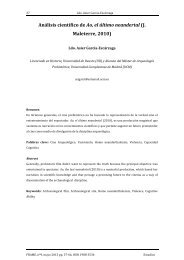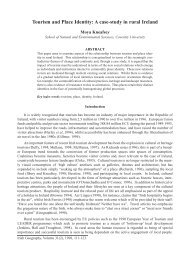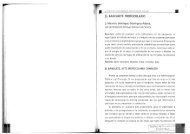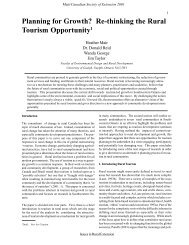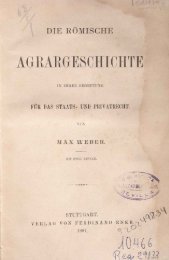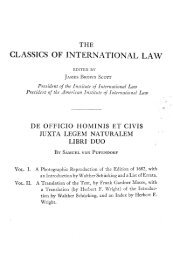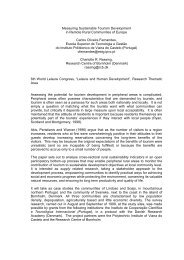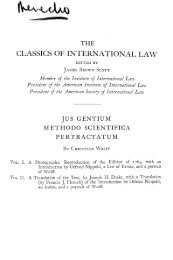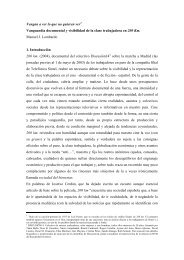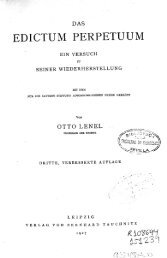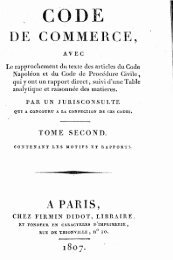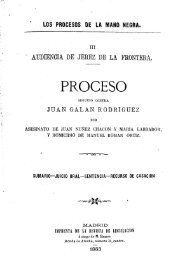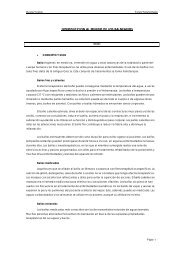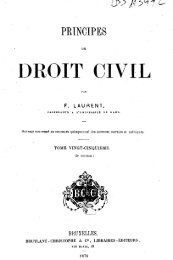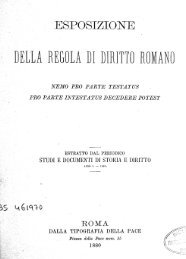Progreso y vicisitudes del idioma castellano en nuestros cuerpos ...
Progreso y vicisitudes del idioma castellano en nuestros cuerpos ...
Progreso y vicisitudes del idioma castellano en nuestros cuerpos ...
Create successful ePaper yourself
Turn your PDF publications into a flip-book with our unique Google optimized e-Paper software.
88<br />
por onde o, u, y h,u; adonde por o (1), <strong>en</strong>contrándose dos- veces<br />
do (e): allí por all /5 allí (3); aquí por aquí e) y ahi Por -<br />
hy, ó y, partícula que usan los Franceses <strong>en</strong> la actualidad e).<br />
onde se usa como modo adver-<br />
Muchas veces el adverbio<br />
bial, y <strong>en</strong>tónces equivale á por donde, de donde, por lo-que, es<br />
decir, se refiere al principio ó disposicion de que se deduce<br />
alguna cosa; y <strong>en</strong> este s<strong>en</strong>tido vemos que dic<strong>en</strong> las leyes: «on..,<br />
de si alguno quisiere franquear el: tan malos tormi<strong>en</strong>tos onde<br />
muriesse (1): onde los antigos dic<strong>en</strong> tal proverbio (8): onde la<br />
claridad <strong>del</strong> noble linaie es fecha vil (9).<br />
Cuando al adverbio no, que se escribia non (10), se añadía<br />
alguna otra palabra negativa, uníanse ambas, contra el uso adop-<br />
( 1 ) E si non oviere ande pague. Ley 5, tít. 6, lib. 5. Fuer. Juzg. .<br />
Que dali ayan el servicio onde ovieron el bi<strong>en</strong>. Ley 19, tít. 7. Id. id.<br />
E si non oviere ande los pague. Ley 2, tít. 1, lib. 6. Id.<br />
Non oviere ande lo peche. Ley 5. Id. id. id.<br />
Pech<strong>en</strong>lo al s<strong>en</strong>nor de la tierra and es. Ley 5, tít. 2, lib. 9.- Id.<br />
E o la ley manda que vala. Ley 3, tít. 4, lib. 2. Id.<br />
Alanzó piedra o estevan muchos omnes. Ley 7, tít. 5, lib. 6. Id.<br />
En la carrera, o los omnes suel<strong>en</strong> pasar. Ley 23, tít. 4, lib. 8. Id.<br />
En los logares u omne non puede fallar. Ley 15, tít. 5, lib. 2. Id.<br />
En aquel logar hu morió. Ley 2, pról. Id.<br />
(2) O do supiere que se mudó la hueste. Ley 8, tít. 2, lib. 9. Id.<br />
Nin sabe do es. Ley 8, tít. 1. Id. id.<br />
(3) Ali ó ellos suel<strong>en</strong>. Ley 14, tít. 2, lib. 12. Id.<br />
O queréllanse alí <strong>del</strong> mal. Ley 18, tít. 4, lib. 5. Id.<br />
Faze él allí ante. Ley 4, tít. 1, lib. 2. Id.<br />
Desde alli a<strong>del</strong>antre. Ley 2, tít. 3, lib. 4. Id.<br />
(4) Tod omne daquí a<strong>del</strong>antre. Ley 7, tít. 4, lib. 2. Id.<br />
Abastelasta <strong>en</strong> esaqui. Ley 8: Id. id. id.<br />
(5) Si ovo y alguna fuerza. Ley 5, tít. 1. Id. id.<br />
By el juez non a y de veer n<strong>en</strong>guna cosa. Ley 21, tít. 2 ., líb. 7. id.<br />
Si ficiere y valladar devel facer seto. Ley 28, tít. 4, lib. 8. Id. .<br />
Que non hy era. Ley 28, tít. 3, lib. 12. Id.<br />
(6) Ley 2, tít. 7, lib. 5. Id.<br />
(7) Ley 2, tít. 1, lib. 6. Id.<br />
(8) Ley 2, pról. Id.<br />
(9) Ley 17, tít. '7, lib. 5. Id.<br />
( 19 )<br />
Hemos <strong>en</strong>contrado algunos casos de excepcion: <strong>en</strong> las leyes 4 y 8, tit. 1,<br />
lib. 2, se dice:<br />
contradecimos que las no us<strong>en</strong>• ca no la a <strong>en</strong> sí;,, y<strong>en</strong> la<br />
ley 2.'ól. «No lo ti<strong>en</strong> Dios.,,<br />
•



